- Home
- Jane Peart
Senator's Bride Page 3
Senator's Bride Read online
Page 3
She took out her compact, flipped open the lid, and took a quick look at herself in the mirror. Did she look like a serious candidate for the position of governess to a twelve-year-old girl? She considered her reflection doubtfully. In spite of having recently turned twenty-four, she looked awfully young. She snapped the compact shut. She'd just have to hope that her other qualifications would compensate for the lack of visible maturity.
Jill reviewed the wording of the ad. The employer was an "American matron." She'd never known any Americans except the few American army officers she had met at some of the dances. She had thought them rather arrogant, too pushy. But I can't be prejudiced, she reminded herself, realizing the truth of the old adage, "Beggars can't be choosers!"
Whatever this American woman is like, I'll take the job . . . that is, if it'soffered. Besides, what choice do I have? She didn't know how to use a typewriter, and even factory workers were being laid off now that the war production had come to an end. She tapped her purse with her fingers in reflection. Goodness knows, I have most of the qualifications I need for this job. She was well-educated, she could read and speak some French and a little Italian, and she was certainly free to travel! Her softly curved mouth tightened in determination. Besides, I need this job desperately. So I shall get it and start a whole new life!
Just then the bus jolted to a stop. Seeing that she was only a few blocks from the fashionable hotel where her interview with Mrs. Devlin was to take place, she pulled the buzzer and prepared to get off.
Covering the distance to the hotel with brisk steps, Jillian entered the once-plush lobby of the Claridge, noticing that it, like every other public building in London, looked a little old and tired. Waiting for the lift that would take her up to Mrs. Devlin's third-floor suite, she checked herself in the mirrored panel between the bronze elevator doors.
Her Worth ensemble had held up surprisingly well. The fitted jacket with velvet collars and cuffs still had style, although the skirt might be a little long for the new trend. But the brown velvet hat, bought in Paris the fall before the war, looked as chic as ever. All in all, she felt satisfied that her appearance, displaying a certain flair and good taste, would meet with the approval of her prospective employer. The fact that her gloves were mended and her shoes needed new soles didn't show. At least Jill fervently hoped not!
At the third floor the operator slid back the filigreed metal door, and Jillian stepped out onto the carpeted corridor. Outside the door, emblazoned with gold numerals, she took a long breath before knocking.
After a few tense moments had passed, a maid in a black uniform and frilly white apron, answered.
Jillian cleared her throat. "I'm Miss Marsh. Mrs. Devlin is expecting me."
The maid nodded. "Come this way, please. I'll tell Mrs. Devlin you're here." She ushered Jillian into a sitting room, then left.
Although elegantly decorated, the room had a cool, impersonal look, with no clue as to the personality of the woman she had come here to meet. That is, at first glance. Then Jillian noticed several photographs in ornate silver frames, resting on a table between two velvet-draped windows. Curious, she walked over to inspect them.
One was a large picture of a graceful young woman in a satin gown with a sweeping train, fashioned in the style of the last century. In her dark hair she was wearing three white plumes—the requisite for a formal Court Presentation. There were two smaller pictures—one, of a handsome little boy in a sailor suit, holding a toy sailboat; the other, of two darling little girls in ruffled frocks, ribbons in their blond and brunet curls, one several years older than the other. Was one of these children the granddaughter for whom Mrs. Devlin was hiring a governess?
Once more Jillian's gaze swept the room, taking in every detail of the lavish decor—the velvet draperies, tasseled and valanced, the folds fanned out on the flowered rug; the French furniture, arranged in conversational groupings about the room; the lamps with their elaborate crystal prisms. The quality of the furnishings was mute evidence that this was one of the most expensive of the hotel suites. Very few people could afford such luxury these days . . . except maybe rich Americans.
"Good afternoon, Miss Marsh." The woman's softly modulated voice hinted at an accent Jillian couldn't place.
She wheeled about. As a young woman, Garnet Devlin must have been stunningly attractive, Jill surmised. Though age had made faint inroads, skill and style had preserved much of the woman's youthful beauty. Elegantly coiffed silver-blonde hair set off the iridescent turquoise taffeta tea gown she was wearing, its long full sleeves trimmed with a narrow band of pale mink.
"Good afternoon," Jill replied, wondering how long the woman had been standing there. Had she seen her examining the photographs? Apparently so, for a shadow crossed Mrs. Devlin's features as she gestured to the larger photograph. "My daughter Faith, lost tragically in the sinking of the Titanic. A loss from which I shall never recover."
She moved regally into the room and motioned to Jill to take a seat on one of the fragile-looking Louis XIV chairs while she sat down on the other. "I've been looking forward to meeting you, Miss Marsh. I've ordered tea for us so we can have our little chat."
Jill, hands clasped tightly in her lap, was conscious of Mrs. Devlin's evaluating glance upon her. Was she measuring up or had she already failed in some way to meet the woman's expectations? Then she noticed that Mrs. Devlin was holding the letter of application in one well-manicured hand.
"I liked your reply to my ad. I could tell right away you'd be exactly right for what I have in mind."
Her remark jolted Jillian. She had heard that Americans were direct, but she had not expected so quick an acceptance. An English lady would be far more subtle, ask many more questions about a prospective employee's background. She would at least wait until tea was served to observe the applicant's manners. Jill realized that she had a lot to learn about Americans.
"You see, not only am I looking for a governess for my granddaughter Bryanne, but a companion . . . someone young and lively and pretty." She laughed gaily. "And now that I've met you, I can see you fill the bill perfectly." Mrs. Devlin seemed pleased with herself as she tapped Jill's letter with her forefinger. "I say I am looking for a companion for my granddaughter, but it is for myself, too. Someone to shop with me, play cards with, handle some light correspondence, that sort of thing. You see . . ."
Mrs. Devlin broke off as the maid entered with the tea tray and set it down in front of her. For a few minutes she busied herself pouring the amber liquid into the teacups. As her fingers moved gracefully, handling the delicate china, Jill not could not help notice the sparkle of several large diamonds. She passed a cup to Jillian along with a folded embroidered napkin, then offered her a plate of crescent-shaped sandwiches and iced petit-fours.
Feeling a fresh hunger pang, Jillian resisted the impulse to take several. Instead, she nibbled daintily on a cream cheese sandwich and took a sip of tea.
"As I was saying, Bryanne's mother, my daughter Faith, is dead, and her father . . . might as well be." Mrs. Devlin's mouth thinned in disapproval. "Nonetheless, Bryanne is my responsibility now. She is away at boarding school at present, and I'm living here temporarily. My townhouse is closed, and my country home, which was turned into a hospital during the War, is undergoing complete renovation. I'm sure you can understand why." Mrs. Devlin sighed, affecting an air of martyrdom.
"Anyway, I shall be taking Bryanne out of that institution soon," Mrs. Devlin went on. "I must confess I was extremely disappointed when I last went to visit her." Here she fixed Jillian with a baleful look. "I do hope you're not a product of an English girls' boarding school!"
"No, I attended school in Switzerland. My mother was in frail health, and my parents went there for her health and enrolled me at the Chalet Ecole. After she recovered, I remained behind to graduate."
"I thought as much." Mrs. Devlin nodded approvingly. "Anyone can see you're a lady. Precisely what I want and need in a role model for Bryann
e. Recently I went down to see her and I was shocked, I can tell you. It seems that most of what they teach the girls is to hit a ball around a field with some sort of stick . . . at least, that's all they did the afternoon I was there. And the outfits are deplorable. For the prices I pay for her school uniforms . . . well, she might as well be wearing a gunnysack!
"As for giving a young lady any sense of correct carriage or deportment . . ." Mrs. Devlin shook her head. "It was deplorable! And Bryanne has gotten fat when we've all been on rations! But then what can you expect from a diet of potatoes and sugary tea? No wonder she's begun to look like a little pudding! Well, something must be done about it right away." The woman set her teacup down with an emphatic click.
"She will leave at the end of the term and that is definite. I would have yanked her out right then and there, but what would I do with her here? There's nothing for a child in a hotel." Mrs. Devlin refilled Jillian's cup. "That's when I got the idea of advertising for a companion-governess, someone suitable to travel with us." She stopped abruptly and looked up. "You are free to travel, aren't you?"
"Yes, I am." Jillian was still stunned by the rapidity with which the interview had progressed to this point.
But Mrs. Devlin did not wait for details and pressed on. "I was planning to take Bryanne home to Virginia—that's our home originally—but I've been so distressed about her. I felt I couldn't take her back there the way she is now. I mean, her relatives who haven't seen her since she was a wee thing . . . well, we have our work cut out for us, my dear." Mrs. Devlin sighed once more. "My intention is to ready Bryanne to take her place in society by the time we return to Virginia. Did I mention that the child is a Montrose?"
There was time only for a quick shake of the head before Mrs. Devlin launched into a recital of Bryanne's heritage.
"At least, on her father's side. The Montroses are one of Virginia's first families, the pioneers who went to America when it was still a British colony. But my granddaughter needs to be prepared, trained for her role. As I said, I feel you will be perfect for the job." Mrs. Devlin paused long enough to beam at Jillian.
"I should like for you to begin in three weeks. Of course, your salary will commence immediately." Then, as if in afterthought, Mrs. Devlin's smooth brow puckered in a slight frown and she asked, "You will accept the position, won't you, Miss Marsh? It may take six months . . . maybe even a year or more, but we shall make this an enjoyable experience. We'll travel, expose Bryanne to the art and culture of the Continent. Perhaps we'll even go to Egypt. I've always had a desire to see the Pyramids. Thus, when we eventually return to Virginia, Bryanne will be a credit to both of us."
When Mrs. Devlin paused at last, Jillian recaptured her wits. "If you please, don't you think we should discuss the matter a little further?"
"Of course! How thoughtless of me. You want to know the salary I intend to pay?" Mrs. Devlin mentioned a figure that caused Jillian's eyes to widen.
"Oh, it isn't the salary that concerns me, Mrs. Devlin. I just think perhaps I should meet your granddaughter, since I am to be her companion and you expect me to exert so much influence. Don't you think we should see if she likes me first, if we would get along?"
"Like you! She'll adore you, my dear. And there's no question that you will like her. Bryanne is a delightful child, an easygoing, merry little soul, as agreeable as the day is long! But if you really feel you must, we could arrange for you to accompany me on the next visitor's day, and you can see for yourself. Would that satisfy?"
Jillian nodded, somewhat relieved. Things had been going much too fast, and she was a bit dizzy. "I think that would be quite satisfactory, Mrs. Devlin."
"Good. Then it's settled. Is this where I may reach you in London?" The woman held up the envelope in which Jillian's letter had been posted and examined the return address. Seeing her nod, she said, "Very well, I'll write to let you know when we can drive down to Devon. And don't bother with one of those public conveyances," she added with an airy wave of her hand. "My driver will pick you up."
When Jillian stepped outside the hotel, her head was spinning with the amazing Mrs. Devlin's plans for the three of them. Apparently the woman never took no for an answer. Still not quite believing her good fortune in securing such a well-paid position with such ease, Jill walked for a while in a daze. When she finally realized she was walking in the opposite direction from the bus stop, she turned to retrace her steps, reliving the conversation with her new employer.
She had actually done it! Gotten the job! But it suddenly struck her as ironic that she should be so elated over her new position. Because her family had lived abroad for so long, Jill herself had never had a governess. But from stories told by her friends about the tricks, teasing, and other sorts of harassment inflicted upon that poor breed, Jill had concluded that in most English households, the lot of a governess, like the policeman in Gilbert and Sullivan's opera, "is not a happy one."
Of course the war had brought many changes to the old class system in England. Then, too, Mrs. Devlin was an American, and Americans were different. At least, Jillian thought, she was gainfully employed. Had even been paid in advance, for Mrs. Devlin had insisted on giving her a check to confirm their agreement.
Preoccupied with these thoughts, Jill didn't see her bus coming until it was at the corner. She ran to catch it, and once settled in her seat she contemplated her future. Mrs. Devlin had mentioned travel. With her money, no doubt their travel would be first class trains, hotels, and accommodations. She had also mentioned taking her granddaughter back to Virginia. Jillian had dreamed of seeing America. Virginia, she mused. Now what had Uncle Greg said about one of our ancestors going to the Colonies before the American Revolution?
Gregory Marsh, Jillian's great-uncle and her only living relative, lived alone in Kentburne, a village about thirty miles south of London. Maybe she should pay him a visit. Yes, she'd send along a note, tell him about her new job, and find out what he knew about the Marsh family history.
Getting off at her stop, Jillian spotted an old woman selling daffodils. The sight of the yellow-bonneted blooms suddenly seemed a good omen. Throwing caution to the winds, she placed a generous amount of pocket change into the gnarled chapped hand of the flower vendor.
Inhaling the fresh scent of the bright blooms and thus cheered, she walked on with a lighter step. The small bouquet would brighten her drab "bed-sitter," the bleak one-room apartment she had called home since coming back to London. Happily, she would not be living there much longer!
chapter
3
AFTER DISPATCHING the note to her uncle, asking if she could come down for the weekend, Jillian received an immediate reply:
My dear girl, I am more than pleased that you want to come for a visit. Although I've just a small cot now, there's a spare room, so I hope you'll plan to spend the entire weekend. I've obtained the housekeeping services of a nice Mrs. Crombie who comes in three times a week to see to things and is an excellent cook. I think we can make you comfortable, and I am looking forward with a great deal of pleasure to seeing you.
The very next Friday Jill packed a small valise and took the bus to Paddington Station, bought her ticket to Kentburne, and found an empty second-class compartment. Having done very little traveling during the War, Jill now noticed the worn upholstery and badly chipped paint. As with all other nonessentials, apparently no maintenance had been done for the last five years.
As the train pulled slowly out of the station, Jillian gazed out the window, thinking that even the people standing on the platform looked drab and forlorn. She wondered if she would find Kentburne as dreary and hoped not, for she had such happy childhood memories of holidays spent at her grandparents' house there.
Though the village was only a short distance away, the train made numerous stops at the small towns along the way, and it was two hours before Jillian arrived. Stepping onto the platform, she glanced about her with a sinking heart. No longer was the station house surrounded
by trim borders of blooming flower beds behind white-painted pickets. With all the young men away at war, there had been no one to tend them, and only the elderly or disabled were left to manage.
Sighing, she set out on foot for her uncle's rented cottage, only a short walk from the center of the village, he had said. She had become accustomed to walking long distances in her war-time job as a messenger for the War Office. Now she often did so to save precious bus fare.
The village itself looked much the same as she remembered—a cluster of stone cottages, a greengrocers' market, a pub, a clothing store and hat shop and, at the end of the street, the gray church with its Norman tower. Just past the center of town a wooden signpost marked "Priory Lane" led into a narrow, winding road. A few yards farther on stood a quaint thatched-roof house. This must be Uncle Greg's "cot." Jillian hurried on, opening the gate and walking through a rambling garden to the red-painted door.
Uncle Greg himself answered her knock and greeted her warmly. "Jillian! Come in, come in, my dear girl. How very nice to see you!" He opened the door wider so she could step inside. "How long has it been?" Jillian opened her mouth to reply, but he answered his own question. "A year or two, I think . . . on the sad occasion of your father's funeral, wasn't it? But then we'll not dwell on sad things. The important thing is that you're here, so we'll have a spot of tea and settle down to catching up. Here, let me have your things." He took her small suitcase and set it down beside a Victorian coatrack.
"You have a job, you say?" he went on. "With an American lady?"
Jillian smiled to herself and hurried to get a word in while he helped her off with her coat. "Yes, a Mrs. Jeremy Devlin. She's in her sixties and enormously wealthy, I gather."
"Hmmm. Jeremy Devlin . . ." Her uncle repeated the name as he hung up the coat, waiting until she had unpinned her hat and handed it to him. "The name is familiar. I wonder if I may have met her at some gathering or other . . . perhaps at the Ainsleys' at a dinner party when I was home on leave from a tour of India. If I recall correctly, her husband was with a publishing firm and the lady in question was a real 'stunner' as we used to say—glorious hair, lovely figure, charming manner of speaking."

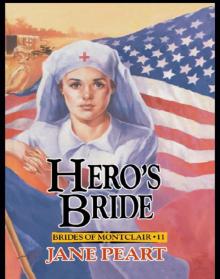 Hero's Bride
Hero's Bride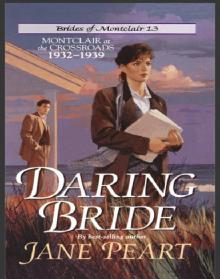 Daring Bride
Daring Bride Runaway Heart
Runaway Heart Promise of the Valley
Promise of the Valley Gallant Bride
Gallant Bride The Pledge, Value
The Pledge, Value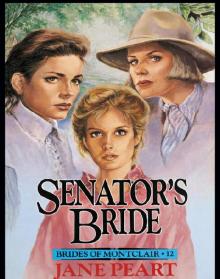 Senator's Bride
Senator's Bride Valiant Bride
Valiant Bride Shadow Bride
Shadow Bride Destiny's Bride
Destiny's Bride A Tangled Web
A Tangled Web Folly's Bride
Folly's Bride The Promise
The Promise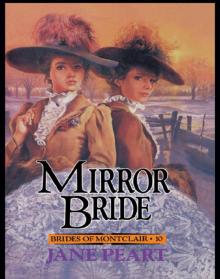 Mirror Bride
Mirror Bride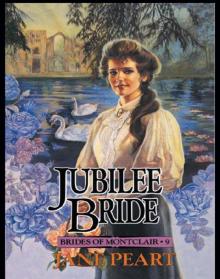 Jubilee Bride
Jubilee Bride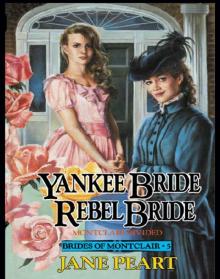 Yankee Bride / Rebel Bride
Yankee Bride / Rebel Bride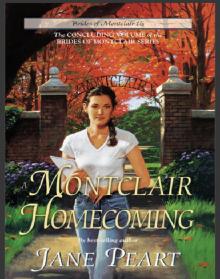 A Montclair Homecoming
A Montclair Homecoming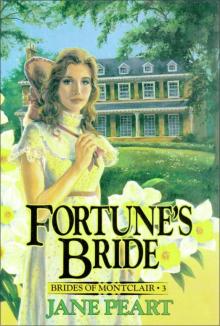 Fortune's Bride
Fortune's Bride Undaunted Spirit
Undaunted Spirit Love Takes Flight
Love Takes Flight The Risk of Loving
The Risk of Loving The Pattern
The Pattern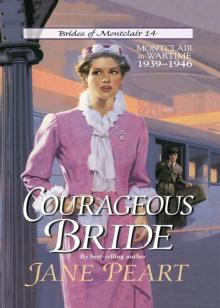 Courageous Bride
Courageous Bride